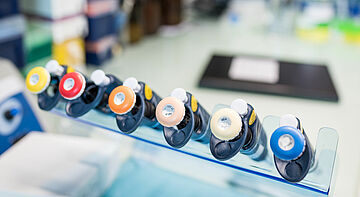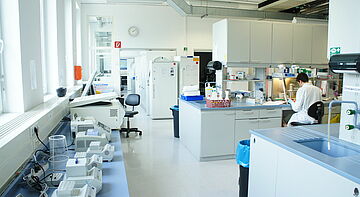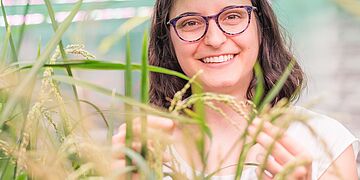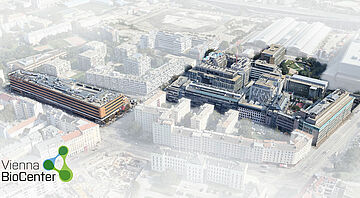The Vienna BioCenter Core Facilities GmbH is pleased to announce that it has received 2.5M Euro from the Austrian Research Promotion Agency (FFG) Infrastructure Call 2022. The project, led by Karl Mechtler and colleagues from the Proteomics Tech Hub at Vienna BioCenter, aims to establish the Austrian Single-Cell Proteomics Platform (AT-SCP), pushing single-cell proteomics from its current developmental stage to a robust technique that can be offered as a collaboration service to the European research community. The AT-SCP will contribute to cutting-edge research in one of the “hottest” topics in life science in the upcoming decades.
Proteins are the main drivers of cellular function, and yet the proteome of single cells is poorly understood. Single-cell proteomics (SCP) is an emerging technology enabled by significant technological improvements over the last years and is key to answering fundamental biological questions. Hence, in-depth characterization of individual cells using mass spectrometry (MS)-based proteomics would be highly valuable to studying the heterogeneity within complex systems. In contrast to single-cell genomics, SCP is still at an early stage of technical maturity. The lack of any amplification method for proteins makes SCP far more challenging due to minimal sample input.
The Proteomics Core Facility (CF) at the Vienna BioCenter Campus (VBC) pioneered experiments with ultra-low input proteomic samples from single cells starting in 2018. Based on this early work, the team identified the need for novel, lossless sample preparation protocols and high-sensitivity MS instruments as key requirements for future single-cell proteomics studies. In a lighthouse project, Karl and his team developed an accurate and reproducible sample preparation protocol using a picolitre handling robotic system. By now, most renowned academic research groups working in single-cell proteomics use this automated system to enable efficient sample preparation in miniaturized volumes and with high throughput.
Based on this success and the gained expertise, the team now aims to establish a novel state-of-the-art single-cell proteomics unit, pushing single-cell proteomics from its current developmental stage to a robust technique that can be offered as a collaboration service to the European research community. This unit dedicated entirely to R&D will be a spin-off of our former Proteomics CF to accelerate our R&D efforts which will be the first of its kind in Austria and Europe. The funding allows for the purchase of state-of-the-art mass spectrometers and sample preparation handling systems that are needed to ensure successful method development in the dynamic and challenging single-cell proteomics field.
Upon successful implementation, the team will tackle the fundamental open questions of human brain development using organoids in collaboration with the Knoblich group (Institute of Molecular Biotechnology Austria, Austrian Academy of Sciences). Additionally, they plan to establish transverse (cross-facility) workflows with the VBCF Plant Sciences CF. Single-cell omics will very soon unveil cellular heterogeneity from a source of noise to a source of discoveries. This will help deepen our understanding of the relationship between the expression, function, and identity of multicellular subtypes connected to downstream applications like early disease diagnosis or the development of tailored therapies. VBC's vibrant environment stimulates collaborations with outstanding scientific groups, capitalizing on new technologies to make groundbreaking discoveries.
Read more on Karl's work:
https://www.viennabiocenter.org/about/news/proteome-pioneer-award-for-karl-mechtler/




